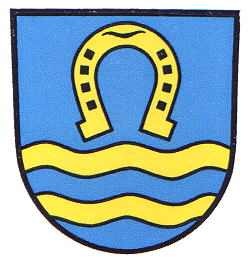Lehrensteinsfeld: Difference between revisions
Jump to navigation
Jump to search
Knorrepoes (talk | contribs) m (Text replacement - "/Arms of " to "/Arms (crest) of ") |
Knorrepoes (talk | contribs) m (Text replacement - "{{media}}" to " {{de1}} {{media1}}") |
||
| Line 24: | Line 24: | ||
The horseshoe already appeared as a typical village symbol on borderstones in the 18<sup>th</sup> century. In the 19<sup>th</sup> century it was also used in the seals of the municipality. In 1959 the horseshoe was combined with two wavy bars, derived from the arms of the Von Schmidtberg family, Lords of Lehrensteinfeld from 1649-1778. | The horseshoe already appeared as a typical village symbol on borderstones in the 18<sup>th</sup> century. In the 19<sup>th</sup> century it was also used in the seals of the municipality. In 1959 the horseshoe was combined with two wavy bars, derived from the arms of the Von Schmidtberg family, Lords of Lehrensteinfeld from 1649-1778. | ||
{{ | |||
{{de1}} | |||
{{media1}} | |||
[[Civic Heraldry Literature - Germany|'''Literature''']]: Bardua, 1987 | [[Civic Heraldry Literature - Germany|'''Literature''']]: Bardua, 1987 | ||
Revision as of 10:59, 26 December 2022
This page is part of the German heraldry portal Deutsche Wappensammlung |
Heraldry of the World |
|
German heraldry:
|
Selected collector's items from Germany:
|
LEHRENSTEINSFELD
State : Baden-Württemberg
District (Kreis) : Heilbronn
| German |
In Blau über zwei goldenen Wellenbalken ein goldenes Hufeisen. |
| English | No blazon/translation known. Please click here to send your (heraldic !) blazon or translation |
Origin/meaning
The arms were granted on August 18, 1959.
The horseshoe already appeared as a typical village symbol on borderstones in the 18th century. In the 19th century it was also used in the seals of the municipality. In 1959 the horseshoe was combined with two wavy bars, derived from the arms of the Von Schmidtberg family, Lords of Lehrensteinfeld from 1649-1778.
Literature: Bardua, 1987


